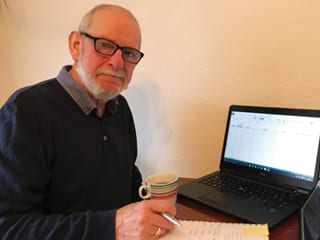Latest News
Paintel recently held an ICATS, Industrial Coating Applicator course. One of the attendees was unemployed and being funded by the Welsh government to assist in gaining employment. Another of attendees, mentioned him to his boss and asked him to attend a meeting after the fourth day of the course, and this resulted in a job offer on successfully completing and passing the ICA course. Both attendees now work for the same company. This shows how ICATS training plays such an important part in providing the future work force for our contracting industry.
It was announced recently that IMechE, in association with Hodge Clemco, were to become an ICATS Approved Training Centre. That process is moving forward even as you read this article. IMechE are currently working on their new LMS (Learning Management System) to enable teaching ICATS as well the Painting Inspector and other courses. Once the ICATS courses have been added to their LMS, the next part of the process is to get them translated into multiple languages by specialist technical translators.
On the 10th March, Kevin Harold, was the guest speaker at the “Energy Coast” evening in Cumbria, organised by Sellafield Nuclear Facility. Kevin’s presentation was called ‘Coating Contractor Tales, a journey of enlightenment’, which was the story of how when Kevin joined the industry in 1976 there was little or no PPE or guidance, up to today and the impact ICATS has had on him and the rest of the industrial painting industry. The presentation was followed by a Q&A session on ICATS, and David Mobbs was also on hand to answer questions on behalf of ICorr.
ICATS ‘Little black books’ for the ICA course are now available. The book includes course information and other additional useful pages, and replaces downloads that many people never look at again. The book fits nicely into a top pocket of a pair of overalls and gives quick reminders including standards, procedures and useful stats and facts.
Email kevin@paintel.co.uk for a black book including details of where and when your ICATS training took place. Copies of the books will also be supplied to ICATS approved training centres over the next few weeks. ICATS trainers will also be contacted to ensure they get access to the books too.
Coronavirus is affecting all of us at the moment one way or another. During this period all ICATS courses have been postponed until further notice, and Kevin is working on other ideas for remote ICATS training. If anyone has any ideas or would like assistance on any ICATS matters, please email Kevin, on
kevin@paintel.co.uk.
Once significant bans have been lifted new course dates with promotional discounts, will be announced.

Latest News
Welcome to the latest issue of the magazine. This month there are two comprehensive technical articles, Markus Büchler of the, Swiss Society for Corrosion Protection on the effectiveness of corrosion mitigation by CP, and the second part of the ship painting article
from Safinah.
For the two new columns introduced in the previous issue, Don Harrop describes the use of Corrosion Inhibitors in oil and gas production in the “Fellows Corner”, and the questions in “Ask the Expert” are on linings for acid storage tanks and how to choose the most suitable for equipment non-intrusive corrosion/erosion monitoring. Remember to send your technical questions for answer by our industry experts.
Finally, I would just like to add my good wishes to that of Gareth, to you all in this troublesome time and remember to keep yourselves and family safe.
Brian Goldie, Consulting Editor

Latest News
It’s impossible for me to open this column without mentioning the ongoing coronavirus outbreak. The situation is unprecedented in the history of the Institute and is clearly going to dominate the activities and priorities of our members for many months. We have put in place policies, working arrangements and contingency plans where possible but of course there is still a lot of uncertainty. Our main priority is the wellbeing and safety of our members, officers and staff and our thoughts go out to all those who have been affected in any way. I trust that you are all are all following the official government guidelines and looking after each other where possible.
It has been a very difficult time for everyone and the Institute is no exception. Cancellations have hit local branch and division events, committee meetings and training courses. However, it has been great to see our tight knit community rally round and show a positive spirit in the face of adversity. This makes me very proud and I would like to commend you all for your kindness and solidarity!
In other news, now that the rebranding of the Institute has been completed attention has turned to our Digital Strategy, which is racing ahead under the guidance of Bill Hedges and David Horrocks. You will have noticed the weekly blogs that we have been publishing on our website and sharing on our social media platforms. These have been enormously successful in driving traffic to our website and raising awareness of who we are and what we do. We are keen to build on this in the coming months and I would strongly encourage you all to share the blogs as widely as possible, comment on them and stimulate discussion to maximise their impact. We are also planning to hold more of our events online going forward, which should enable us all to stay connected in these challenging circumstances
We are always striving to improve the quality of service we provide to our members and a recent useful addition has been the facility for free download of papers from every EuroCorr conference since 2004, which can now be found in the Members Area of the ICorr website. Credit goes to the eagle eye of Brian Wyatt, who spotted on the EFC website that Member Societies are entitled to this facility. If you are aware of any other benefits that we should be offering to our members, or would like to make any suggestions, please let us know.
One significant change at Corrosion House in the past few weeks has been the retirement of Gwynneth Moore. I would like to thank Gwynneth sincerely for the outstanding job she has done over the past few years, particularly in keeping on top of membership administration, which is by no means an easy task. In fact, such was her dedication to the Institute that she postponed her planned retirement at the end of 2019 to cover a temporary staff shortage in the office, which was very much appreciated by Denise and the Trustees. Her proof reading skills will also be sorely missed. We wish Gwynneth all the best in her retirement – although I wouldn’t be surprised to see her helping out in the office again from time to time!
As one chapter closes another one begins and I am pleased to announce the two latest additions to our office team; Dorota Maliszewska and
Rebecca Hurst. I’m sure you will join me in offering them a very warm
welcome to the Institute.
Please keep an eye on the Institute of Corrosion website for updates on our response to the ongoing coronavirus situation. Stay safe and look after
each other.
Gareth Hinds, Institute of Corrosion President
Latest News
This is a new regular column where readers can submit generic (not specific project) questions relating to corrosion protection, to be answered by corrosion experts. This month, the questions relate to zinc rich coatings and the problems of monitoring CP on pipelines affected by induced AC
Question:
With the advent of high quality three layer polyolefin pipeline coatings and liquid or heat shrink field joint coatings having similar corrosion barrier characteristics, current densities for Cathodic Protection (CP) have been greatly reduced. These coated pipelines when in the presence of high voltage overhead power transmission systems tend to experience high induced a.c. voltages as well the possibility of phase to ground faults, which can create a ground potential rise and damage the coating and pipe steel. To provide personnel safety and to protect pipeline integrity induced a.c. and fault a.c. mitigation is required. When such mitigation measures are installed they often take the form of electrical grounding using liner electrodes of zinc or copper connected to the pipeline via d.c. decouplers, where these decouplers proliferate due to the design requirements they can adversely affect the operators’ ability to undertake close interval potential surveys (CIPS) due to capacitor discharge. This discharge supports what should be the IR free potential during the rectifier off cycle thereby providing erroneous and misleading results.
Given this issue what can be done to ensure the pipeline is correctly protected and can the situation be controlled such that CIPS may be carried out, and if not what are the alternative technologies which will prove assurance that protection has been attained? AN
Answer:
Decouplers on well-coated pipelines can affect off potential readings during CIPS testing. The engineer measuring the results may witness irregular off potential waveforms at or near to where decouplers are installed. Most notably, the off values will be excessively and un-characteristically negative, and where there are multiple decouplers, the effect can be magnified and difficult to ameliorate. It could be incorrectly concluded that the pipeline was well protected, however it is known that such off potential values are in error. In some cases, such polarized values are not actually possible on a protected pipeline and instead of having a clean on/off potential waveform it is observed that the off potential is supported at a much more negative value.
In the past several tests have been undertaken on well coated pipelines to improve the response during the IR cycle including, capturing the reading later in the cycle, setting the on/off interruption cycle for longer periods or removing the decouplers from the system. These measures were not in all cases successful, and in the latter case, removing the decoupler can result in an unsafe situation as the induced voltage could rise above the 15V ac safe level established by NACE SP-0177 2014.
Given that disconnecting the decouplers in the presence of induced and fault a.c. is a high-risk strategy from a personnel and livestock perspective other methods of providing IR free potential measurements need to be relied upon. Such measurements can be provided by means of coupons using a magnet and a reed switch, to provide potential measurements which can be relied upon to provide an indication of present and ongoing protection. IR free coupons represent a low-cost option for obtaining polarized potentials because they avoid measurement errors due to current flow in the soil and are independent of the pipeline readings and the effects of decoupler capacitor discharge. Coupons may be used for any application where an independent reading is required. In addition, CIPS is not the only method in which pipeline integrity can be established as a DCVG survey may be carried. DCVG is an important and reliable survey method in pipeline construction and in the past has provided an accurate method of locating and recording the severity of line pipe coating defects which expose bare steel. Where indications have been located with DCVG they can be exposed and any damage repaired. DCVG provides a tool which allows the greater majority of coating defects to be located, excavated and repaired thereby limiting the CP current demand and improving pipeline protection. TCO
Readers can submit questions for possible inclusion in this column. Please email the editor on, brianpce@aol.com

Blogs, Conferences and Events, Corrosion Engineering Division
How to Benefit from Institute of Corrosion T&D Initiatives Online
With the coronavirus lockdown firmly in place in most parts of the world, businesses and people are adjusting to the new normal. One of the hardest hit business activities is training and development. This is bad for businesses and their employees. Of course, the safety of employees is critical but so, too, is the continual upskilling and development of those employees.
Analysis by McKinsey in early March found that already around half of in-person training and development programs had been cancelled through to the end of June 2020. As the extent of lockdown has increased across geographies, this rate of curtailment will have snowballed.
Given that your professional development is key to both your career and the future of your employer, what has been the response by businesses and how can you keep your career on track?
3 Training and Development Strategies Adopted by Businesses
Generally, we’ve seen three approaches to training and development during the lockdown:
1. Suspend/cancel training & development
Some businesses have drastically cut back or even cancelled all their training and development. They have done this to reduce costs. Some of these companies have laid off staff and are seeking to recruit experienced people to help them through this difficult period. (Staffing Future is the first company we know that has developed a not-for-profit recruitment website to match people to jobs that suit their skills specifically for COVID-19 jobs in the UK and the United States.)
2. Transition training & development as an online resource
Other businesses are helping their employees adjust to online working and encouraging continuation of CPD by transitioning existing training and development as an online resource. Such organisations are using working from home as an initiator to encourage upskilling toward a new normal that is likely to include more working from home – even after the lockdown has ended.
3. Increase accessibility to training & development
The third business model is increasing capacity and accessibility to training and development. The issue that many businesses have here is that their IT capability is already stretched. They simply don’t have the bandwidth to offer the desired depth and breadth of training and development to an army of employees wishing to connect via video.
Online Training & Development with the Institute of Corrosion
Organisations have been forced to prioritise their approach to training and development – for both what they believe is needed and what they can reasonably provide. This has necessarily meant that much training and development has been postponed or cancelled. The knock-on effect for individuals is that their own CPD – and therefore their career path – has been put on ice.
As a not-for-profit organisation committed to continuous development of knowledge and expertise within a supportive and inclusive framework (read about our core values here), the Institute of Corrosion is adjusting to the current lockdown environment at pace. We understand that it is imperative for industry professionals and members of the Institute of Corrosion to continue to develop professionally.
Training and development initiatives that we have in place include:
- A series of online training courses that can be accessed via the training and qualification pages on the ICorr website.
- The Industrial Coating Applicator Training Scheme (ICATS) ICA module is now available online. You can learn the theoretical aspects of application and complete all the tests within the programme from the comfort of your own home during lockdown. For further information, please email Kevin Harold at Kev@paintel.co.uk.
- One of our training partners, Corrodere, specialise in providing training packages developed with industry experts to ensure that users gain insight into basic corrosion, methods of surface treatment and application of protective coatings – with many of its courses available through online training. Contact Corrodere for more information.
- We are working with other training providers to enable you to continue your professional development during lockdown. For example, IMechE Argyll Ruane are working on the delivery of an online classroom-style training programme. Further announcements will be made as soon as this is available, but please email argyllruane@imeche.org for more information.
- We’re also in the process of transitioning the Fundamentals of Corrosion course for delivery online. Please, if you are interested in learning more and participating online, contact admin@icorr.org.
5 Benefits of Online Training
Because you are working from home or furloughed, you don’t need to put your professional development on hold. In fact, the online training and development initiatives we have already released and those that we are working on will help you develop a broader appeal as the world returns to work. The benefits of online training include:
- More affordable – online training and development can generally be delivered at reduced rates (and sometimes free, as with our Corrosion Engineering Division Working Day, which is now being held online)
- More flexible – adaptable to different learning styles and flexible to fit your personal timetable
- More convenient – take your course with you wherever you are, and balance between your work and free time
- More comfortable – if you don’t like sitting in classrooms, you’ll love learning in the comfort of your own home
- Improves career prospects – with more time on your hands and more flexibility to learn, taking online courses during the COVID-19 lockdown will demonstrate your commitment as well as provide valuable skills and knowledge that will help to develop your career
Make sure your career stays on track. Stay tuned to the Institute of Corrosion blog to learn of the latest developments in training and development in the corrosion industry.


